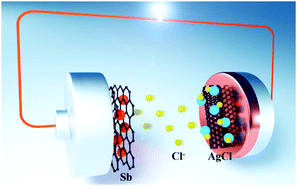Sb nanoparticle decorated rGO as a new anode material in aqueous chloride ion batteries†
Abstract
An aqueous chloride ion battery (CIB) is an emerging technology for electrochemical energy storage as well as battery desalination systems. However, the instability and decomposition of electrode materials in an aqueous medium is a major issue in CIBs. Herein, in one step, we synthesized fine antimony nanoparticles with a size of ∼20 nm on reduced graphene oxide (Sb@rGO) sheets using a hydrothermal route with facile and cost-effective processes. It is proposed as a new anode material and coupled with the AgCl cathode in an aqueous CIB. The specific capacity is maintained constantly at 51.6 mA h g−1 at a current density of 400 mA g−1 even after 200 cycles. In addition, characterization methods such as electrochemical analysis, X-ray diffraction, etc. were used to confirm the reaction mechanism. The chloride ion capture material developed in this research work will be significant for CIBs as an energy storage technology or battery desalination system.



 Please wait while we load your content...
Please wait while we load your content...